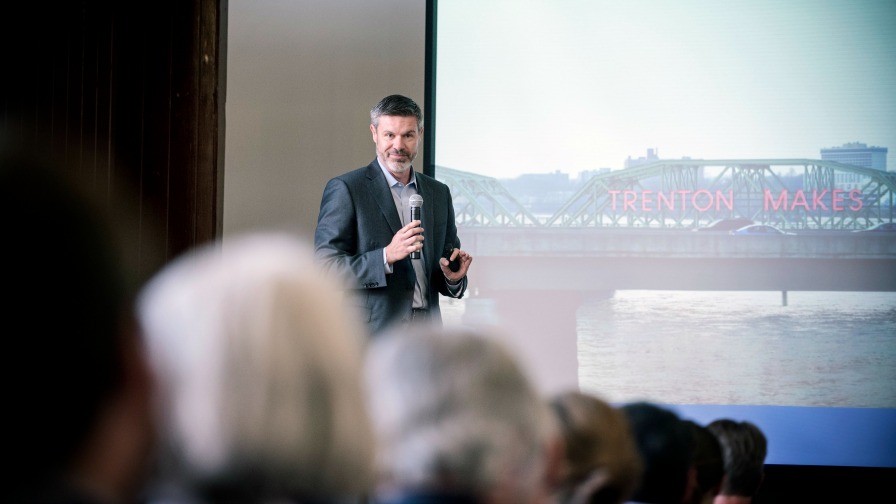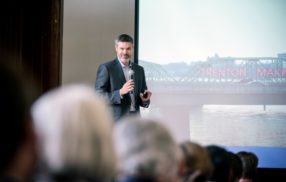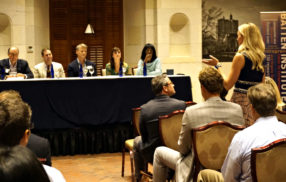
Virginia Officials Examine Entrepreneurial Ecosystems at UVA Darden
By Dave Hendrick
Eager to build a sustainable base of long-term economic development, localities across the country are seeking to foster the environment and conditions that will allow entrepreneurship and venture creation to take flight.
At the Virginia Department of Housing and Community Development’s Building Entrepreneurial Economies Innovation Day event at the W.L. Lyons Brown III i.Lab at the University of Virginia, entrepreneurs, economic development officials and researchers came together to discuss the creation and continued development of so-called entrepreneurial ecosystems in the state.
The choice of location was fitting, as the i.Lab serves as one of the key hubs in the emerging Charlottesville, Virginia, entrepreneurial ecosystem, which has seen a host of venture creation activity in recent years, much of it spun-out from UVA and the Darden School of Business, home to the Batten Institute for Entrepreneurship and Innovation.
In addition to helping drive the phenomenon of sustainable local venture creation, Darden and the Batten Institute are seeking to better understand how and why entrepreneurial ecosystems take hold, launching the Cities Innovating Tomorrow’s Entrepreneurial Ecosystems (CIT.ee) initiative to determine the drivers and consequences of successful entrepreneurial economies.
Darden Professor and Chief Strategy Officer Mike Lenox, who helps lead the CIT.ee research at Darden, told attendees that entrepreneurial ecosystems often spring from environments that include a rich set of endowments such as held by large research universities; vibrant culture; a business-friendly environment; and resources to stimulate new business such as venture capitalists, business accelerators and business networks.
While Silicon Valley is typically considered the premiere example of an entrepreneurial ecosystem, its scale and unique qualities make it a poor point of comparison, according to Lenox. Instead, the CIT.ee initiative studies mid-sized cities with evolving ecosystems such as Boulder, Colorado; Provo, Utah; and Charlottesville to draw more relevant lessons.
In Charlottesville, which was named the fastest-growing venture capital city by the National Venture Capital Association in 2016, Lenox said recent signs of success were the result of both favorable endowments and years of concerted effort.
“In many ways Charlottesville has all the requisite endowments that would lead us to believe we would be successful in this, but there have also been the efforts of thousands of people to try to build this system up,” Lenox said. “It takes time, effort and endowments, and you have to figure out how to build those rich interconnecting networks. Entrepreneurship is about networking and building community, and that takes place in a small footprint.”
Lenox said the Darden School began actively growing its emphasis on entrepreneurship roughly 15 years ago, and it has seen that shift pay off in both successful venture creations and national rankings for entrepreneurship.
Conference goers also heard from i.Lab Director David Touve and economic development specialists conducting work in smaller communities throughout Virginia. Touve led attendees through an exercise to assess the areas in which their own entrepreneurial ecosystems were strongest, what those ecosystems needed to be stronger and how they could support other attendees.
Annette Patterson, president of The Advancement Foundation in the Roanoke, Virginia, area, said her nonprofit seeks to be a vital intermediary, helping small and new businesses find the partners they need throughout the community, as well as identifying creative ways to leverage resources or sources of support.
“Everyone has something to offer,” Patterson said. “You just need to learn what it is.”
The University of Virginia Darden School of Business prepares responsible global leaders through unparalleled transformational learning experiences. Darden’s graduate degree programs (MBA, MSBA and Ph.D.) and Executive Education & Lifelong Learning programs offered by the Darden School Foundation set the stage for a lifetime of career advancement and impact. Darden’s top-ranked faculty, renowned for teaching excellence, inspires and shapes modern business leadership worldwide through research, thought leadership and business publishing. Darden has Grounds in Charlottesville, Virginia, and the Washington, D.C., area and a global community that includes 18,000 alumni in 90 countries. Darden was established in 1955 at the University of Virginia, a top public university founded by Thomas Jefferson in 1819 in Charlottesville, Virginia.
Press Contact
Molly Mitchell
Senior Associate Director, Editorial and Media Relations
Darden School of Business
University of Virginia
MitchellM@darden.virginia.edu








